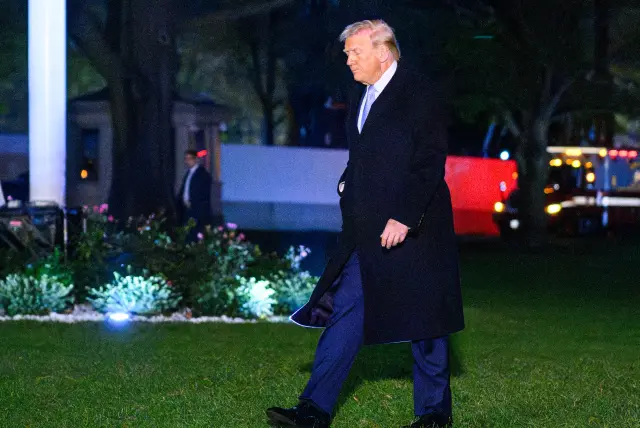
Countries doing business with Russia could face severe sanctions, President Donald Trump has said as he teased legislation that could further hurt the country’s status as a key energy exporter.
Trump told reporters Sunday that congressional Republicans were readying legislation to sanction countries trading with Moscow in a move that comes only weeks after the U.S. sanctioned Russian energy giants Rosneft and Lukoil and their subsidiaries.
Berlin-based energy analyst Thomas O’Donnell told Newsweek that the U.S. moves to punish Russian energy exports combined with Ukraine’s repeated strikes on Russia’s oil refineries threatens to “disable Russia as a petrostate.”
Berlin-based energy analyst Thomas O’Donnell told Newsweek that further sanctions were part of an escalating US-Ukraine joint oil offensive on Moscow that will do “great damage to Russian revenues.”
Newsweek has contacted the Kremlin and the White House for comment.
Why It Matters
Trump’s announcement is the latest action he has taken to curb Russian oil and gas revenues to force Vladimir Putin to the negotiating table after sanctions in October targeted, Rosneft and Lukoil, along with their subsidiaries.
Those sanctions have already led to Chinese state-owned refiners halting purchases of Russian oil, and a move to punish other countries for doing energy business with Moscow will add to woes for its economy, including high inflation and low growth which could make continued high defense spending unsustainable.
What To Know
Trump told reporters on Sunday that any country which does business with Russia would face severe sanctions and that legislation was being readied to tackle those trading partners with Moscow.
Trump said Iran may also be added to the list in an announcement that follows the U.S. sanctions revealed against Lukoil and Rosneft last month.
This came after the president expressed his unhappiness that peace proposals for the Ukraine war were going nowhere.
Bloomberg reported Chinese oil refiners, including state-owned giants such as Sinopec and PetroChina Co, and smaller private refiners, known as “teapots,” are shunning Russian shipments after the U.S. sanctions announced last month.
Russian crude flows to India, are also expected to plunge with Bloomberg reporting last week that five big Indian refiners haven’t placed any orders for Russia oil for December.
Trump gave no further details Sunday, but his comments were his strongest indication that he would support legislation long championed by Republican South Carolina Senator Lindsey Graham and backed by Senator Richard Blumenthal, a Connecticut Democrat.
The bill could mean tariffs of up to 500 percent on imports from countries that buy Russian energy products which are not directly helping Ukraine and would target the biggest consumers of Russian energy, such as China and India.
Republican Senate Majority Leader John Thune said last month he was ready to bring legislation to a vote, but didn’t “want to commit to a hard deadline.”
Such measures could further hurt Russia’s energy sector which has been left reeling by Ukrainian drone strikes hitting refineries.
Reuters reported on November 14 that the Black Sea Novorossiya oil export terminal was hit hard by drones affecting two percent of global supply.
Previously, Russia’s Tuapse oil export terminal, also in the Black Sea, was hit three times by Ukrainian drones, and reportedly by a cruise missile.
Such measures could further hurt Russia’s energy sector which has been left reeling by Ukrainian drone strikes hitting refineries.

O’Donnell, who produces The Global Barrel website, told Newsweek tough tariffs like those imposed on India, combined with secondary sanctions from Congress could be quite affective in slashing Russian export barrels.
He said that Russia has narrowed its oil exports, which were discounted due to price-cap pressures, essentially to two big buyers, India and China. Instead of spreading these barrels across tens of smaller buyers, Russia focused on buying support from the two most powerful customers possible. But it would be difficult for Russia to diversify to other customers now given the harsh sanctions risks, he said.
The constant campaign of Ukrainian drones and cruise missiles on refineries has already sharply cut Russian revenue from oil-product exports and the air war against the Black Sea ports is now becoming a sustained effort. “Since it has been revealed the air war against refineries is closely coordinated with USA intelligence and logistics, we should expect the ports campaign is too,” O’Donnell said.
When the two big Baltic export terminals are added to the Black Sea terminals as repetitive targets, “this forced erosion of Russian “export capacity will be a significant sanctions force multiplier.”
Alex Adamo, CEO of negotiating firm The Commercialiser, told Newsweek, targeting Rosnet and Lukoil is a way for Trump to further corner Putin’s economy so he has no choice but come to the negotiating table with less maximalist proposals.
“An even more powerful approach, would be if Trump convinced the EU to coalesce against Russia and adopt the same uncompromising stance and cease gas and oil imports to EU states,” he added.
What People Are Saying
President Donald Trump: “The Republicans are, putting in legislation that (will be) very tough…on any country doing business with Russia. They may add Iran to that.”
Berlin-based energy analyst Thomas O’Donnell said sanctions and strikes on Russian energy facilities: “could be the strategic aim of the escalating U.S.-Ukraine joint oil offensive on Russia. In any case; it will do great damage to Russian revenues and markets abroad.”
What Happens Next
There will be anticipation over what Trump’s comments mean for Graham’s legislation and whether it will imminently be brought to a vote with the Republican senator saying that support for his bill crossed the 60-cosponsor threshold for passage.
Meanwhile, continued Ukrainian strikes against Russian oil facilities will force cheaper Russian crude into a global market with fewer buyers willing to risk breaching U.S. sanctions, adding to turbulence in the Russian economy.
